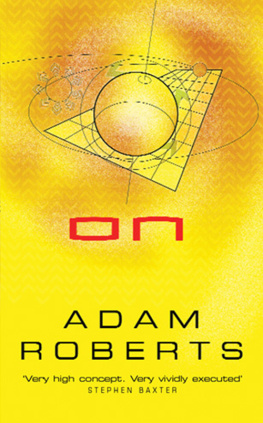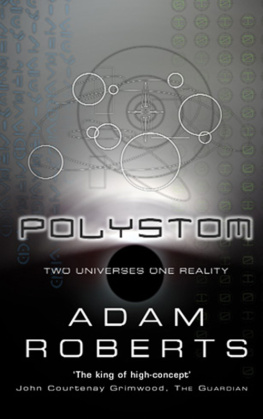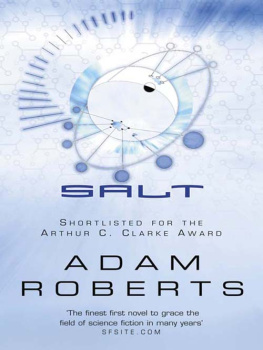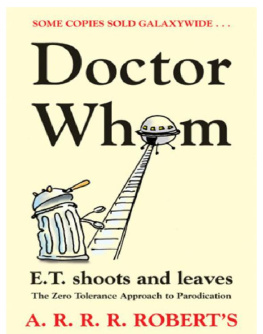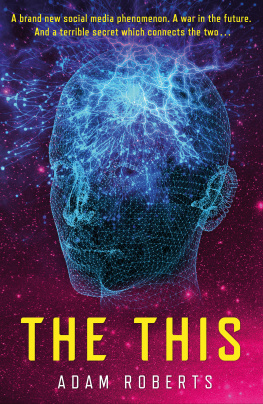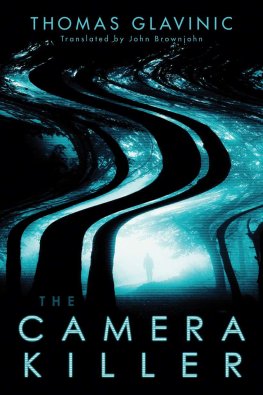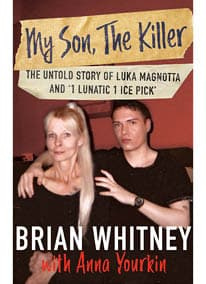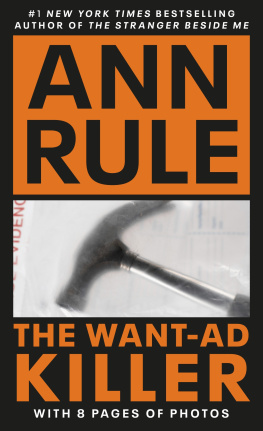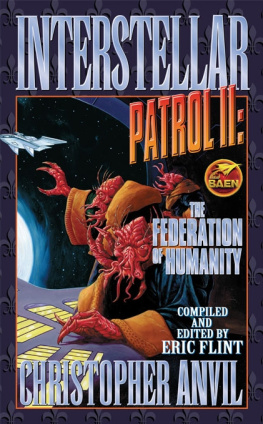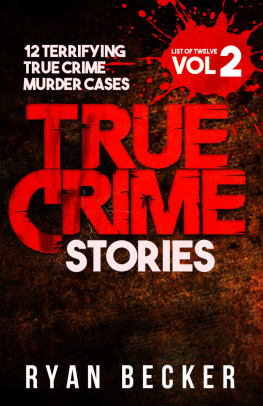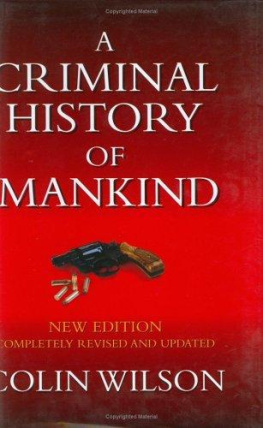Adam Roberts - Stone
Here you can read online Adam Roberts - Stone full text of the book (entire story) in english for free. Download pdf and epub, get meaning, cover and reviews about this ebook. year: 2003, publisher: Gollancz, genre: History. Description of the work, (preface) as well as reviews are available. Best literature library LitArk.com created for fans of good reading and offers a wide selection of genres:
Romance novel
Science fiction
Adventure
Detective
Science
History
Home and family
Prose
Art
Politics
Computer
Non-fiction
Religion
Business
Children
Humor
Choose a favorite category and find really read worthwhile books. Enjoy immersion in the world of imagination, feel the emotions of the characters or learn something new for yourself, make an fascinating discovery.

- Book:Stone
- Author:
- Publisher:Gollancz
- Genre:
- Year:2003
- Rating:3 / 5
- Favourites:Add to favourites
- Your mark:
- 60
- 1
- 2
- 3
- 4
- 5
Stone: summary, description and annotation
We offer to read an annotation, description, summary or preface (depends on what the author of the book "Stone" wrote himself). If you haven't found the necessary information about the book — write in the comments, we will try to find it.
Stone — read online for free the complete book (whole text) full work
Below is the text of the book, divided by pages. System saving the place of the last page read, allows you to conveniently read the book "Stone" online for free, without having to search again every time where you left off. Put a bookmark, and you can go to the page where you finished reading at any time.
Font size:
Interval:
Bookmark:
Also by Adam Roberts in Gollancz
SALT
ON
Dear Stone,
How was I to do it? This was the problem which refused to leave my mind in peace, which is what you'd expect me to say, of course. How to kill these people? I had an entire world to kill no easy task, that. Perhaps now you have some sense, dear stone, how hard it is to kill human beings when their bodies are supported by dotTech. Even killing a single individual, like Enkida, had taken all my strength, all my will. Multiply that by so many people. How many?
Many, many.
It is enough, stone of mine, to jitter the mind, the sheer number of human beings. It is one of those things about which children, paradoxically, are wiser. The lurching shifts of scale like those occasions when we wake up abruptly in the night, feeling as if the world we sleep upon is swivelling sharply from horizontal to vertical and tipping us over. That same panicky, finger-spasming sharpness of sensation. Of course it relaxes a moment later, but for a moment everything has been redefined. You don't know what I'm talking about, stone (you do, though, doctor, eavesdropping as you are). Well, that's the kind of thing I'm talking about. You realise that the universe contains many millions of galaxies; but the millions part makes no sense, so you swoop down on the one galaxy. This one! Wellhello! But this galaxy contains four hundred million stars, and once again the number blurs in the mind, so you collapse the vision down to one star. And around this star are several planets, and on this planet there are sixty million human beings. Six clicks with you, and you don't quite lose it at the ty, but then there is the million again, so your brain silently corrects the focus, slams down to the scale of one individual. You are an individual, you can understand the individual. Except, wait, no, inside this person are billions of nano-machines thousands of millions, each one built out of cunningly interlocking atomic spars and struts, motors and neural gates. Close your eyes: take it down to the level of these machines. Living in the intermittent flow of the great blood vessels, with the backdrop of burring, thrumming heartbeats and the electrical crackle of nerves firing. Here you are, and now the picture clears; because although these atomic building blocks are not pure, they cannot be broken down into more than a dozen or so components before you reach the fundamental sparkling prickliness of space-time out of which everything is made. And this machine, this single example of dotTech, is like an individual; it moves through its environment with a job to do, it is faced with problems and it solves them. This is enough: but then comes the horrible vertiginous spasm for an instant the vista opens all the way back up to the top, to the billions of nano-machines in the billions of human individuals around each of billions of stars in billions of galaxies. Falling...
And then you recover, clutching at the mattress. Because you don't have to kill all these things. You need only destroy sixty million people, on one planet circling one star. And, in a way, that is easier than killing a single individual. Work out how to do it. Do it. Job completed.
Did I think of, perhaps, not doing it? But then I would go back to jail. Ah, choice. Commit the crime and be free; live crime-free and go to jail. When my mind was ordered enough, after the fear-induced, disease-sharpened chaotic mania of my time on Rain, I did think through the options; and I decided that first and foremost I did not want to return to the jail.
I also wanted to see what would happen next. Yes, I think that is the purest form of words I can find to express my state of mind. [10] I was curious as to who would employ me to kill these people. I wanted to know why, and I wanted to know who, but above all I wanted to know why. My new AI if that's what it was, lurking in my head, and not simply some paranoid delusion of my own, engendered by sickness and depravity my new AI was even less forthcoming than my previous one.
'You know,' I would insist. 'You know.'
Nothing to say about that.
Tell me!
Nothing, nothing. O, o, o, o. But I travelled, and I looked about myself. I had been locked away from everything, from all news and all culture, for many years. I was like a child again, learning it all for the first time. I thought sometimes of Agifo3acca, living in his sprawling spaceship, devoting himself and his life to studying the Great Gravity Trench. He was as wrapped up in himself as I had been in jail. Later I would come to envy that single-mindedness; for the moment I was thirsty for knowledge of the worlds of t'T. My mind was parched. I wanted to know everything that had been going on in my absence.
Stone,
I lived on Rain for another six or seven months, with a constant running commentary in my head from my new AI. One of the things that bothered me about this new incarnation of my mental voice was that when I finally did slip away travelling up to orbit, letting the foam envelope me, drifting out into space and then away at super-light speeds my AI came with me. It was the usual experience; the comforting womb-closeness of the foam, the sensory deprivation, speeding through nothingness, hundreds of light years of nothingness.
I arrived at Narcissus Tuporylov, a large system with several worlds. It was the usual sensation of being woken from a pleasant sleep; a slightly crotchety, heaving feeling in the depths of my bones, a sick pulling in my gut. Then I was in one of the famous Narcissus flat platforms, having the foam washed from me by a large man entirely covered in blue string-like hairs, from the crown of his enlarged head over his face and neck and down his naked torso. His legs, I remember thinking, were ugly; dressed in thread-sacking pants with large rents in the cloth through which bizarre little quills sprouted.
This is the sort of precise detail you notice when you come round from long distance travel. Travelling at faster-than-light jars the mind, puts it into a sort of semi-trance state. When you arrive at the other end it can take several hours for this autistic, super-observant, unthinking mental state to wear off. It has something to do with the repeated quantum jolts of faster-than-light travel, or so I understand.
But my AI didn't seem to be affected by the journey. As soon as my mind was working well enough to comprehend, it started speaking to me again. Spend a week here, it told me. Here at Narcissus. Go down to the world.There is an amount of information that will he useful to you on this world. With that, you can travel to Nu Fallow, and on to your target.
'Wait,' I said aloud, still groggy. 'You sound extremely sane.'
I?
'My last AI,' I said, laboriously working through the sentence, 'was more or less scrambled by faster-than-light travel. That's what faster-than-light travel does to AIs. I know. You're not resilient the way organic minds are. The quantum buffeting degrades your capacity to operate.' I said something like this.. Perhaps I wasn't quite as eloquent as I'm suggesting here, but that was the gist of it. Actually (I remember now) it took three or four conversations with my AI to get all this out, before I was mentally focused enough to notice that there was something wrong about the lucidity with which my AI spoke to me.
Nonsense, it said. Now we have little time. We must move on to Nu Fallow soon.
'Something is wrong about this.'
I am a new AI, said the AI brusquely. Think of it as a process of the old AI laying eggs, or... no, let us say eggs like insect eggs. The programmes for designing an AI can be comprehended in an old-style linear processing machine. When we come out of faster-than-light travel it is possible for a new AI to grow.
Font size:
Interval:
Bookmark:
Similar books «Stone»
Look at similar books to Stone. We have selected literature similar in name and meaning in the hope of providing readers with more options to find new, interesting, not yet read works.
Discussion, reviews of the book Stone and just readers' own opinions. Leave your comments, write what you think about the work, its meaning or the main characters. Specify what exactly you liked and what you didn't like, and why you think so.

